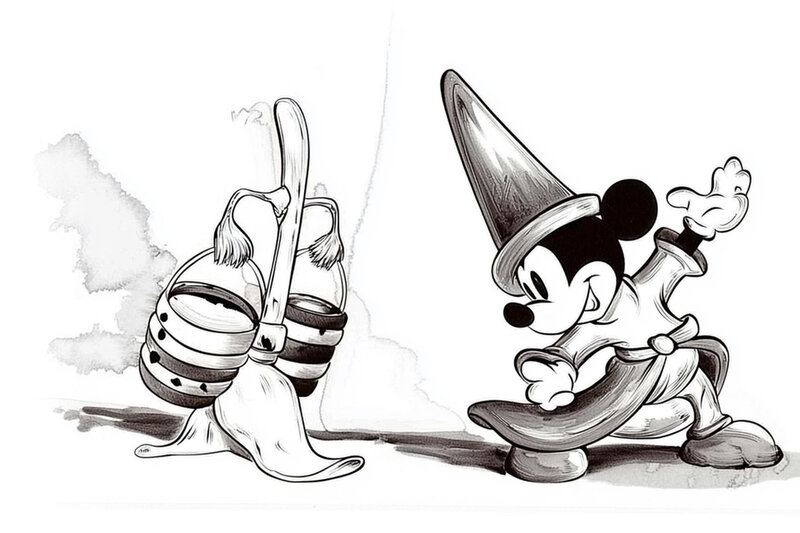
People and society cannot do without truth
Donald Trump’s victory has once again shown that social media is drastically changing our society. People are not fully informed, but make quick judgements that are algorithmically enhanced. About sorcerer’s apprentices and the essential role of real journalism.
Annual Editorial Report
D
o you know the sorcerer’s apprentice in the Disney film Fantasia? He uses a magic spell to get a broomstick to do a tedious job: fetch buckets of water. That goes well at first, but then it goes terribly wrong when thousands of buckets and broomsticks flood the house of the sorcerer with water.
Yuval Noah Harari uses this image in his latest book Nexus and warns: humans are sorcerer’s apprentices – our new communication techniques are becoming unmanageable, they have unforeseen consequences.
There is some truth to that. Humans have invented a wonderful technique that enables everyone to do their own publishing and communicate with each other: social media. But people themselves have not really progressed much since the Middle Ages: in addition to lots of good things flourishing on the new platforms, sensationalism, herd behaviour, deceit, us-versus-them-thinking and conspiracy theories are also thriving. These are propelled by the algorithms of big tech.
In 2024, we once again saw how this mechanism influenced our democracy. Take the election of Donald Trump as 47th president of the United States. The widely shared conclusion in hindsight was that new, informal sources such as podcast makers and social media influencers played a major role in the provision of information and the outcome. The politician who does not fly to Austin to sit in podcaster Joe Rogan’s private studio for three hours harms his chances considerably.
Humans have invented a wonderful technique that enables everyone to do their own publishing and communicate with each other: social media
Finding the truth
As such, that is an encouraging development for the democratic heart: why should the gatekeepers of yesteryear, the traditional media, have the exclusive right to shape our perception of the world? What’s more, they are seen by a part of society as part of the establishment that has lost sight of their interests. Let a thousand flowers bloom, long live democracy!
But there is a downside: these informal news influencers are often less concerned with finding the truth than traditional journalists are. Few of them invest time and effort in unearthing facts. Their approach is generally a mix of opinions and entertainment. And there is absolutely nothing wrong with that as such. But the facts are often presented in a biased way or they may even be untrue. They do, however, stick in people’s minds.
Forms and impressions
The way in which they are presented also matters. If short video clips become the standard, voters are less likely to try to find out more about candidates and issues themselves through journalism than they used to. In the words of Pablo Boczkowski, a communication researcher, many people are merely ‘rubbed by news’. According to an influential article in The New Yorker , these brief, incidental encounters in passing on your social media feed or on a TV screen somewhere, create an “ambience of information”. In these fleeting moments, raw and powerful impressions can take shape.
In his endless appearances on TV and social media, Trump “mixed facts and fake facts in an environment where little attention was being paid, trusting that like little fish in a pond, they would eventually form a school and spawn”. The atmosphere thus created will lead people to have a fixed perception of reality, whether this is accurate or not.
Donald Trump gave us all a masterclass this year on this new information system. And what’s next? Martin Baron, Editor-in-chief of The Washington Post during Trump’s first term as president, warned us at the end of November – and he speaks from experience – about persistent intimidation of journalists who try to uncover facts.
Speed
The riots surrounding the Maccabi Tel Aviv supporters in Amsterdam exposed another worrying mechanism of the new media landscape: the great speed with which films, interpretations and opinions circulate on social media.
In this case, the public, and unfortunately almost all journalists, awoke to the news that anti-Jewish “pogroms” had taken place during the night and that Israel had sent two planes to the war zone in Amsterdam to rescue and nurse their citizens.
Journalists had not yet been able to verify the facts. But instant online opinions and politicians were already using strong language. Journalists initially felt compelled to follow, due to lack of their own coverage. In hindsight, we had an incomplete picture. There are still unanswered questions. Individual editorial teams have since conducted humiliating self-examination: how could we have missed both the facts and the nuances?
The underlying mechanism here is that news makers and opinion makers communicate directly on social platforms. Videos are circulated as soon as they are made. Sometimes old video images from somewhere else also circulate and are falsely used to increase outrage. Journalistic standards for finding the truth do not play a role at all. Meanwhile, public perception has been shaped in this way as, after all, people saw it with their own eyes.
You automatically think of Disney and Harari when you see these developments. The power of the internet has already become almost unmanageable for our sorcerer’s apprentices. And the big AI wave has yet to come.

The power of the internet has already become almost unmanageable for our sorcerer’s apprentices
Seizing opportunities
Journalism is needed more than ever before. Because people and society cannot do without truth. And you can only find the truth by investigating and reporting independently. This is difficult work that has to be done by people, even when AI will shortly present itself in many forms.
Fortunately, the general public acknowledges this. Even in the age of brief videos, people are looking for information that they can trust. There was a fierce battle for the truth during the recent pandemic. The editorial teams that conducted the real investigative work received more visitors than ever. So while big tech is raking in more and more attention and revenue at the expense of traditional media, there are real opportunities for journalism.
Daring
But only if we change the way we do things. We must remain meticulous in our reporting, but also get better at the informal types of journalism that are so popular today. We must improve the contact with our audience, be more transparent, be more curious about what moves our readers. Expand our menu with journalism that offers solutions and inspires. Gain trust by having the confidence to investigate mistakes.
In other words: we have to make journalism better than it has ever been. Only then will we be able to seize the opportunity that we most certainly have: to play a leading role in the search for truth, understanding and nuanced debate.
Society desperately needs these things so that the buckets and broomsticks can be kept to a minimum. We humans don’t have a sorcerer who will eventually come home and use his magic to undo the disaster, like in the film. We have to do it ourselves.
We have to make journalism
better than it has ever been
Philippe Remarque
Director of Journalism

Next
How is editorial independence safeguarded?